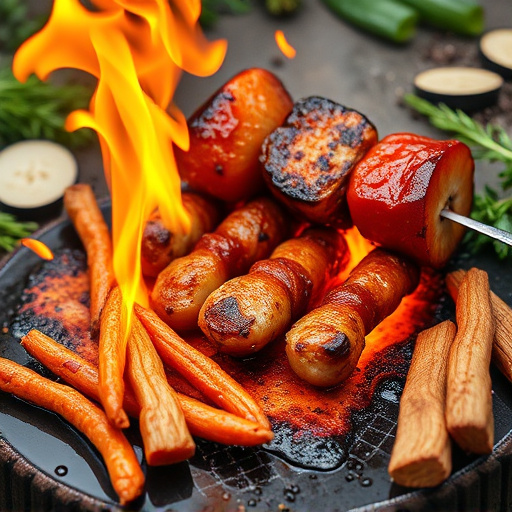Crafting the perfect BBQ jerky at home starts with selecting lean cuts of meat like sirloin or beef brisket, and preparing a balanced marinade with acidity, sweetness, savory, and spicy flavors. Use a dehydrator for ideal texture and smoky taste, or oven-dry at 170°F (77°C) for quicker results. Store jerky airtight at room temp or freeze for up to several months. Experiment with diverse flavor profiles and herbs to create personalized BBQ jerky recipes tailored to your taste buds.
“Transform your BBQ game at home with our ultimate guide to crafting tender, mouthwatering BBQ jerky. Discover the secrets behind the perfect cut of meat, from beef or chicken to pork and venison. Learn about marinade mastery—a key to flavor infusion—and explore various drying techniques for that crispy texture. We’ll navigate cooking tips, storage tricks, and even offer creative flavor variations to make your DIY jerky journey a juicy success. Get ready to sink your teeth into the ultimate BBQ Jerky Recipe!”
- Selecting the Right Cut of Meat for BBQ Jerky
- Marinade Ingredients and Preparation Techniques
- Drying Methods for Optimal Texture and Flavor
- Cooking Tips for a Delicious End Product
- Storage and Shelf Life Considerations
- Creative Flavor Variations for Your Jerky Experience
Selecting the Right Cut of Meat for BBQ Jerky
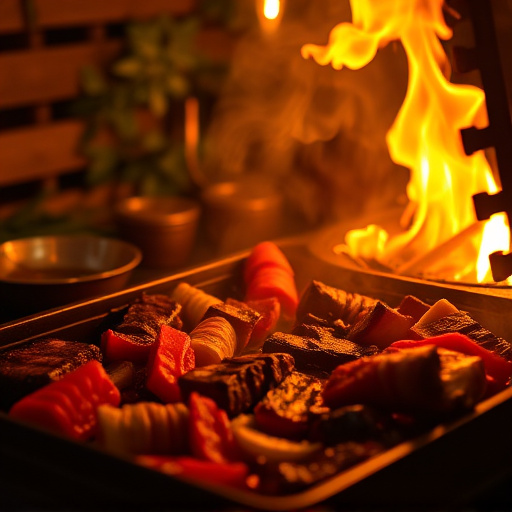
When crafting your perfect BBQ jerky at home, choosing the right cut of meat is a crucial first step in your journey to deliciousness. Opt for lean cuts like sirloin or flank steak for the best results in your BBQ jerky recipe. These cuts have less fat, ensuring your jerky turns out crispy and not greasy. Lean meat also means less moisture, which is ideal as it allows the flavors of your marinades to really penetrate the meat during the drying process.
Remember, the goal with BBQ jerky is a tender, flavorful treat. Steer clear of cuts with significant marbling or visible fat, as these can make your jerky soggy and less satisfying. With the right cut selected, you’re well on your way to creating a mouthwatering BBQ jerky recipe that will have you and your taste buds craving for more.
Marinade Ingredients and Preparation Techniques
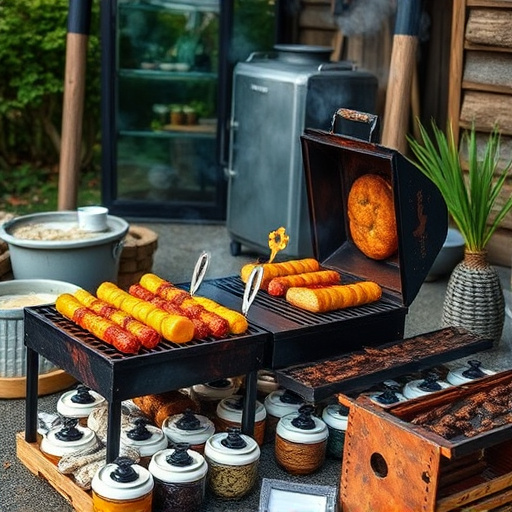
Creating a mouthwatering BBQ jerky at home starts with a well-crafted marinade. The key to a tender, flavorful BBQ jerky recipe is balancing acidity and sweetness, along with savory and spicy notes. Common marinade ingredients include soy sauce or vinegar (for acidity), brown sugar or maple syrup (for sweetness), garlic and onions (for savory), and various spices like paprika, peppercorns, and chili powder for heat.
Preparation techniques vary but typically involve mixing the ingredients in a bowl, then submerging your meat (usually beef or chicken) in the marinade. This process can last anywhere from several hours to overnight, depending on desired tenderness. For optimal results, use a non-reactive container and ensure all surfaces of the meat are coated evenly. Some experts even suggest using a vacuum sealer for more efficient marination.
Drying Methods for Optimal Texture and Flavor
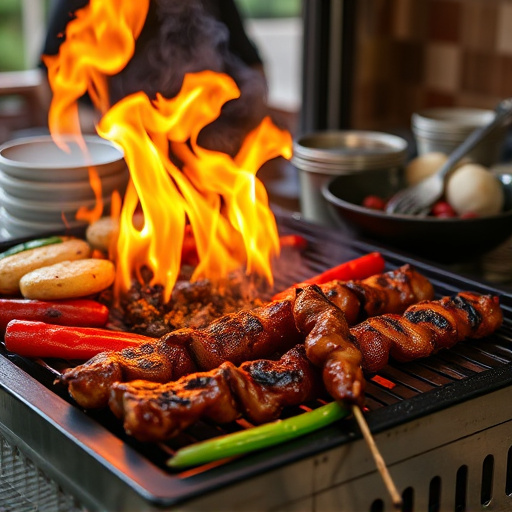
When it comes to drying BBQ jerky, the method you choose plays a pivotal role in achieving that perfect texture and flavor profile. Two popular techniques stand out among the rest: using a dehydrator or drying in an oven. For a true BBQ jerky recipe, a dehydrator offers exceptional results, allowing for slow, even drying that preserves the meat’s natural juices and intense smoky flavors. This method ensures each piece of jerky turns out tender and lean, without over-drying or losing its juicy center.
In contrast, oven drying is a faster alternative suitable for those with limited time. However, it requires close monitoring to prevent over-drying, which can result in tough, brittle jerky. Preheating the oven to a low temperature (around 170°F) and using a rotisserie or rotating rack ensures even drying. Regularly checking and flipping the meat ensures consistent results, allowing you to craft mouthwatering DIY BBQ jerky that rivals store-bought varieties.
Cooking Tips for a Delicious End Product

When preparing your BBQ jerky at home, the key to a delicious end product lies in the marination and cooking process. Start by choosing the right cut of meat—beef brisket or sirloin are popular choices due to their lean yet flavorful nature. Next, prepare a marinade that complements your desired BBQ flavor profile; a mix of soy sauce, brown sugar, garlic, and spices like paprika, black pepper, and chili powder works wonders. Allow the meat to soak for several hours or even overnight in the fridge to ensure maximum flavor absorption.
Before cooking, preheat your oven to a low temperature—around 250°F (120°C)—to gently dry out the meat and intensify its natural flavors. Use a jerky-specific cutting board and knife to slice the meat thinly, ensuring even thickness for consistent cooking. Once prepared, place the slices on a lined baking sheet, leaving space between each piece. Bake for approximately 4-6 hours or until the meat is tender and shrinks when bent slightly. Regularly rotate the sheets for even cooking and check the jerky’s temperature with a meat thermometer to ensure it reaches the safe internal temperature of 160°F (71°C).
Storage and Shelf Life Considerations

When it comes to storing your homemade BBQ jerky, keep in mind that proper conservation is key to maintaining its quality and extending its shelf life. For optimal freshness, store your jerky in an airtight container at room temperature, away from direct sunlight and heat sources. This will help preserve the flavorful, tender meat for up to 2 weeks.
For longer-term storage, consider freezing your BBQ jerky. Place it in a freezer-safe bag or container, ensuring it’s sealed tightly to prevent freezer burn. Frozen jerky can last for several months, making it an excellent option for those who enjoy having delicious, homemade protein on hand for quick snacks or meal additions.
Creative Flavor Variations for Your Jerky Experience
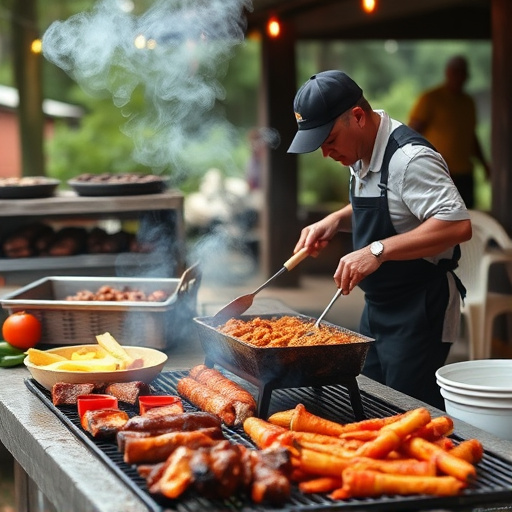
When crafting your own BBQ jerky at home, don’t be afraid to get creative with flavors. Beyond the classic BBQ sauce, there’s a world of possibilities to explore. Consider mixing up your marinades and rubs with unique ingredients like chili powder, cumin, or even a touch of brown sugar for a sweet and savory twist. For an Asian-inspired jerky, try soy sauce, ginger, and garlic. Alternatively, a citrusy kick from lemon juice, orange zest, or even pineapple can add a refreshing note to your BBQ jerky recipe.
Don’t overlook the power of herbs! Fresh rosemary, thyme, oregano, or basil can lend complex flavors that complement traditional BBQ perfectly. Play around with different combinations until you find your favorite blend. The beauty of making jerky at home is the ability to customize it precisely to your taste, so get adventurous and create a flavor profile that’s uniquely yours.
